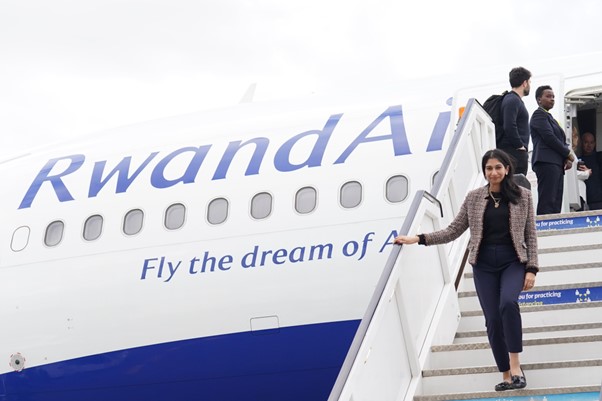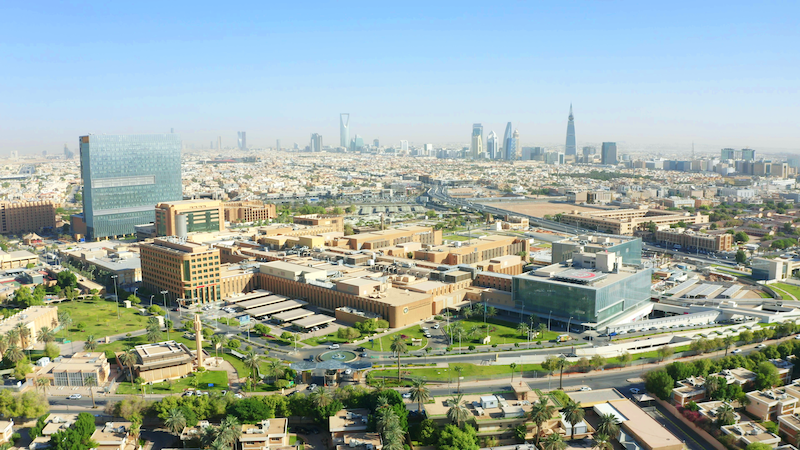Ongoing legal battles have meant there has yet to be any migrants sent to the East African nation under the policy. Meanwhile, the Channel migrant crisis continues amid much political debate.
Here is how events leading up to the ruling from the UK’s highest court on Wednesday have unfolded since the Rwanda plan was unveiled:
– 2022
April 14: Following a drastic increase in the number of people crossing the Channel, then-prime minister Boris Johnson announces a plan to deport migrants arriving in small boats to Rwanda for their claims to be processed. He says this would act as a “very considerable deterrent”.
June 15: The first deportation flight to Rwanda is cancelled just minutes before take-off following a ruling by a judge at the European Court of Human Rights in Strasbourg.
August 23: The Ministry of Defence says 1,295 migrants made the crossing in 27 boats, a record figure which remains the highest figure for a single day.
August 25: Former home secretary Dame Priti Patel announces an agreement with the Albanian government to curb the numbers of migrants from that country amid concerns they account for 60% of all those arriving in the UK.
November 14: New home secretary Suella Braverman signs an agreement with French interior minister Gerald Darmian allowing British officers to join French beach patrols.
November 23: Mrs Braverman admits the Government has “failed to control our borders”, but tells MPs they are determined to “fix” the problem, following criticism of overcrowding at the Manston processing centre in Kent.
December 14: Four people die while 39 others are rescued after their dinghy capsizes in the Channel.
December 19: The High Court rules the Government’s Rwanda policy is lawful, but orders the cases of the first eight deportees to be reconsidered.
December 31: A total of 45,755 migrants made the Channel crossing over the course of the year, according to Government figures.
– 2023
January 4: Prime Minister Rishi Sunak announces legislation to tackle the migrant crisis is one of five key priorities for his premiership.
March 7: Mrs Braverman tells MPs the Illegal Migration Bill will impose a legal duty to remove those arriving in the country illegally, barring them from claiming asylum in the UK.
March 10: Tensions mount as Mr Sunak defends the policy as “the right approach” against criticism from sports pundit Gary Lineker which led to a high-profile impartiality row at the BBC and numerous colleagues threatening to boycott Match Of The Day in solidarity with the presenter.
March 12: Chancellor Jeremy Hunt does not rule out the prospect of children being detained under the new plans, which would see those crossing the Channel eligible for asylum only in a “safe” third country such as Rwanda.
March 13: The plan draws criticism from former Tory prime minister Theresa May, who says it is “not enough” to send people to claim asylum in Rwanda and warns the UK is “shutting the door” on victims of modern slavery as it currently stands.
March 14: A High Court judge rules that asylum seekers facing removal to Rwanda can appeal against Home Office decisions over alleged errors in the consideration of whether relocation poses a risk to their human rights, dealing another blow to the plan.
March 17: Mrs Braverman doubles down on the deportation policy on a visit to Rwanda despite the plan remaining embroiled in legal battles, claiming the £140 million deal will be a “powerful deterrent” to those attempting to cross the Channel.
March 18: Mrs Braverman is given a tour of potential migrant housing after the land was purchased by the Rwandan government, ahead of meeting with President Paul Kagame and her counterpart Vincent Biruta to discuss the deal.
March 29: The Government unveils plans to house asylum seekers on disused military bases, ferries and barges in a bid to cut spending on hotels.
April 26: The Home Secretary says migrants crossing the Channel have values “at odds” with British norms and are linked to “heightened levels of criminality” – comments which are condemned by Labour.
May 25: Figures show the asylum backlog has hit a new record high with more than three quarters of claims made by people who crossed the Channel since 2018 still awaiting a decision.
June 5: Mr Sunak insists his plan to stop Channel crossings is “starting to work” but plays down suggestions that fewer arrivals were a result of poor weather conditions at the time of year rather than policy decisions.
June 18: The number of Channel crossings for the year so far tops 10,000.
June 26: Estimates in a Home Office assessment reveal £169,000 could be spent on every asylum seeker forcibly removed to a third country such as Rwanda.
June 29: The Home Secretary lashes out at “phoney humanitarianism” hindering efforts to stop Channel crossings as the Government loses the latest legal battle over its plans to send migrants to Rwanda after a Court of Appeal ruling.
July 3: A new record is set for migrant crossings, with 3,824 arrivals in June – the highest total for that month since records began in 2018.
July 10: MPs learn the Home Office is paying for thousands of empty hotel beds reserved for migrants to avoid overcrowding at processing centres.
Meanwhile, immigration minister Robert Jenrick is lambasted from his own backbenches in Parliament after defending the painting over of cartoon murals at a unit for lone child asylum seekers.
July 12: The first asylum seekers arrive at former RAF airbase Wethersfield Airfield in Essex as it is brought into use as accommodation. Legal action is brought against the plans.
July 13: The Government is given the go-ahead to take the legal battle over its Rwanda deportation policy to the Supreme Court.
July 20: Despite condemnation from campaigners, sweeping asylum reforms under the Illegal Migration Bill become law after being given Royal Assent and being made an Act of Parliament. But it is unclear when the new rules will come into force.
The number of migrants crossing the Channel tops 14,000 for the year so far.
July 21: Officials insist the Bibby Stockholm barge, due to house migrants in Portland off the Dorset coast, is not a “floating prison” as they give reporters a tour of the facilities.
July 27: Mrs Braverman buys marquees to sleep 2,000 asylum seekers on disused military sites in a bid to avoid using hotels ahead of an expected surge in Channel crossings.
July 28: It emerges plans to move 2,000 migrants into RAF Scampton in Lincolnshire – which is subject to a legal challenge – have been delayed until October.
August 1: Figures show the average number of migrants crossing the Channel per boat in July (52) was the highest on record for any month since records began in 2018.
August 2: The Fire Brigades Union (FBU) calls for an urgent meeting with the Home Secretary over safety concerns about the Bibby barge, later raising the possibility of legal action.
August 5: Mr Sunak announces a plan for social media firms including Facebook, TikTok and Twitter to team up with the National Crime Agency to crack down on people smugglers’ posts encouraging asylum seekers to cross the Channel.
August 7: The first group of asylum seekers finally boards the Bibby Stockholm after weeks of setbacks and delays.
Meanwhile, official figures confirm more than 50,000 migrants are living in hotels.
At the same time, the Government announces fines will rise for employers and landlords who give unauthorised migrants jobs or tenancies.
August 8: Justice Secretary Alex Chalk defends the Government’s announcement of a “task force” targeting corrupt immigration lawyers as critics brand it a “red herring” to distract from the asylum backlog.
August 9: The Home Office announces that the UK and Turkey have struck a new deal to “disrupt and dismantle” people smuggling gangs in a bid to tackle the surge in illegal migration.
August 10: Fresh arrivals of people on lifeboats take the number of Channel crossings since 2018 past the 100,000 mark.
Reports the same day suggest senior ministers were split over whether the UK should ditch its commitment to the European Convention on Human Rights (ECHR), which underpins the country’s duty to help migrants.
August 11: Asylum seekers who arrived on the Bibby Stockholm barge are removed after Legionella bacteria was found in the water.
August 12: Six people are confirmed to have died after a boat carrying migrants sank in the Channel.
August 19: More than 25,000 asylum seekers are said to have arrived in Britain via small boats since Mr Sunak became Prime Minister, according to figures analysed by the Labour Party.
August 24: The UK’s asylum backlog hits a a new record high, with 80% of people waiting longer than six months for an initial decision.
Mr Sunak warns the system is under “unsustainable pressure” after the bill for the taxpayer almost doubles in a year to nearly £4 billion.
August 27: The Home Office is considering fitting asylum seekers arriving in the UK via unauthorised means with electronic tags, The Times reports.
September 3: The highest number of small boat migrant crossings in a single day of 2023 is recorded, with some 872 people crossing on 15 small vessels.
September 14: Labour leader Sir Keir Starmer insists closer co-operation with the European Union on the small boats crisis means “taking control of a situation the Government has totally lost control of”.
Sir Keir indicates he could be prepared to do a deal with Brussels which would involve the UK taking a quota of asylum seekers who arrive in the bloc in exchange for the ability to return people who cross the Channel.
September 19: The Home Office is paying “around £8 million” per day for asylum seekers to be put up in hotels, according to the department’s annual accounts.
September 26: Mrs Braverman uses a speech in the United States to advocate for the United Nations’ Refugee Convention to be overhauled as part of wider efforts to stop small boats crossing the Channel – comments that are rebuked by the United Nations High Commissioner for Refugees (UNHCR).
In other comments criticised by equalities campaigners, she says offering asylum to a person because they are discriminated against in their home country for being gay or a woman is not sustainable.
September 27: Asylum seekers pretend to be gay to “game the system” and to get “special treatment”, the Home Secretary says.
October 3: Small boat arrivals in 2023 pass 25,000, figures confirm.
At the Conservative Party conference, Mrs Braverman warns that a “hurricane” of mass migration is coming as Business Secretary Kemi Badenoch stresses the need to be “careful” in the language used on the issue.
October 5: Tens of thousands of people in the asylum system could be at risk of homelessness as the Government works to clear the so-called legacy backlog before the end of the year, the British Red Cross warns.
Mr Sunak says the UK is making progress in its bid to secure a deal with the EU’s border agency to get access to the bloc’s intelligence on migration.
October 6: The Prime Minister says he agrees multiculturalism has not failed but claims there is an “enormous sense of frustration” in the UK over “illegal” migration.
October 9: The start of a three-day hearing at the Supreme Court of the Government’s challenge to the Court of Appeal’s ruling that the plans to send asylum seekers to Rwanda are unlawful.
November 13: Mrs Braverman is sacked after a series of inflammatory remarks, claiming sleeping rough is a “lifestyle choice” and accusing the police of bias over pro-Palestine marches. James Cleverly takes over as Home Secretary after being moved from the Foreign Office to make way for the return of former prime minister Lord David Cameron. PA reporters/ The Independent








